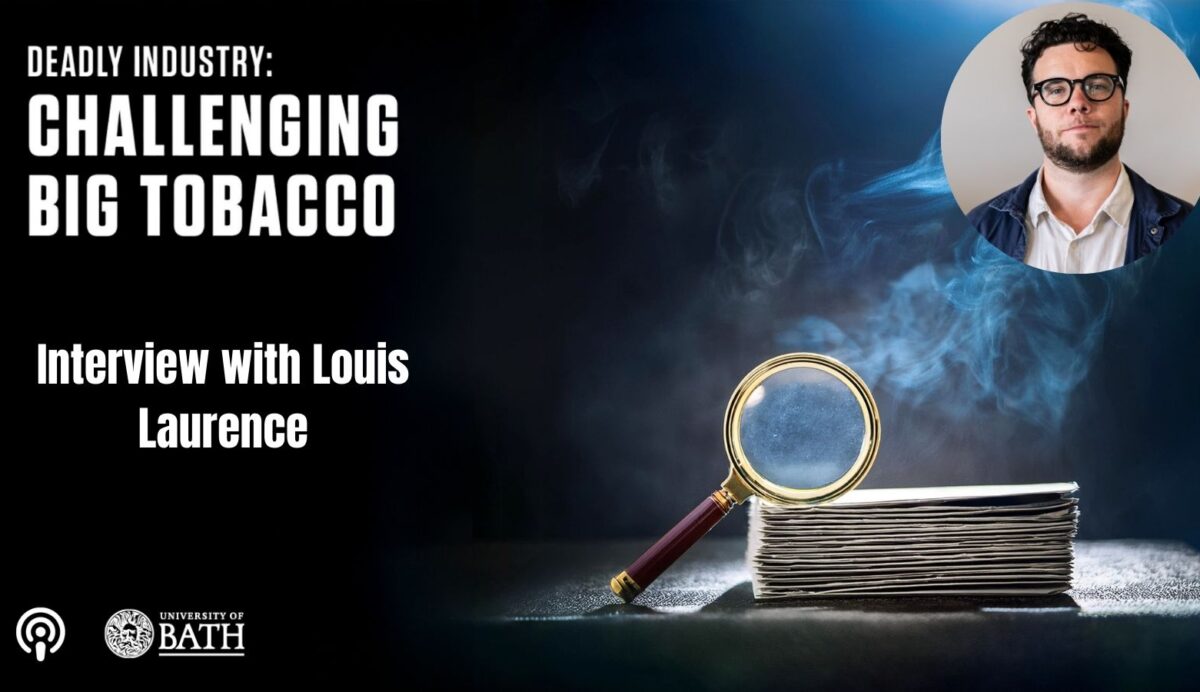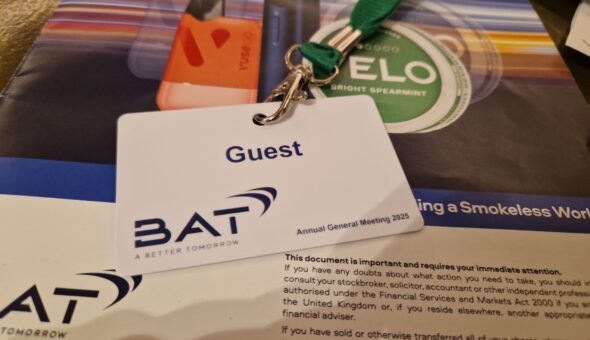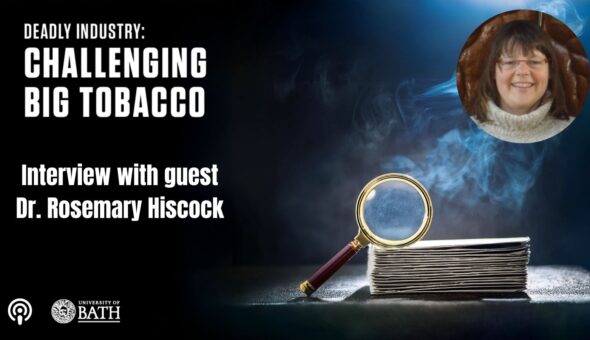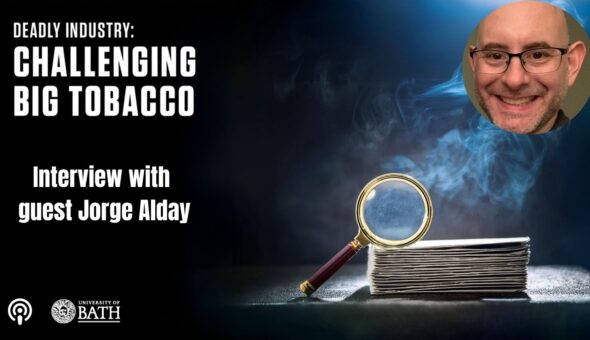This blog is part of our series of conversations on all things podcast to celebrate the launch of Deadly Industry: Challenging Big Tobacco. This time we are speaking with Louis Laurence, Investigative Research Assistant at the University of Bath.
Louis is the host of all eight episodes of series 1 of Deadly Industry: Challenging Big Tobacco where he speaks with a range of guest experts on all things tobacco control.
(Opinions expressed in this blog are those of the author, not of the Tobacco Control Research Group or the University of Bath)
Why did you want to get involved in the project?
Podcasts are a really fun format to work with because you have a lot of freedom without a lot of expense. Ever since I joined TCRG I have wanted us to make a podcast so I'm glad that we have been able to make it happen now.
I'm a big podcast fan. I recently completed an MSc in Science Communication and a big element of that was knowledge exchange including audio production and science documentary making, as part of that I got to record a radio show at the BBC studios.
A lot of the work we do with Tobacco Tactics is also about taking complicated research and making it accessible for a wider audience so a podcast felt like a good fit.
What was your experience of working on the podcast like?
It was a very positive experience and it's also been a good way of getting to know my colleagues in a different light and building some of those relationships.
Once we were in the recording studio every guest had really interesting things to say. It made me feel proud of how impactful our work can be.
Did you experience any particular challenges with the process?
Scheduling was a bit of a challenge, our guests are all in different places and have different needs so that wasn't so easy to organise.
We worked with an external podcast producer on the project, Kate White, so that was really helpful when any challenges did come up. I have learnt a lot about professional podcast making through this partnership.
Did the experience differ from your expectations at all?
I wouldn't say that it has differed hugely because I did have some experience so I knew what recording would feel like.
It was great to have a dedicated space in the University recording studios and dedicated time in my schedule to properly work on the project. I often work from home and it surprised me how much of a difference recording in a dedicated space made to me and the guests, it helped us be really focussed and in that moment.
I was also really impressed by the support we had from the AV team at the University, particularly from Sacha Goodwin. They have a very professional set-up which made such a difference.
Did you have any concerns about taking part in the podcast?
Yeah, with this work there is always a concern about putting yourself out there in a public way.
This can be challenging content and we are taking on powerful corporate entities, so there is risk involved in that, particularly legal risk and that is why we are very careful about how we frame things. All our work is evidence based and focussed on TCRG research.
What do you think of podcasts as a medium to disseminate research on this topic?
Ultimately it's the human factor which is important with podcasts.
They can be such a diverse format - I listen to a lot of highly produced investigative podcasts and also a lot of more conversational podcasts.
Academics are often working within rigorous and highly considered formats - especially when writing papers but also with a lot of the work we do on Tobacco Tactics we have to be very rigorous.
A podcast like this gives experts the chance to bring a bit more humanity into their work - they can share how they feel about it, what their passions are.
With this podcast, we are talking about some of the foundational ideas in tobacco control, in an accessible way. This means that people who may already be interested in the topic but aren't experts or academics or journalists can understand it and we can get important stories out.
With a lot of our work, people might say "so what, we know the tobacco industry is bad" but some of the really interesting areas which we are working on aren't hugely discussed in the wider media or in the public realm so this is a nice way of bridging that gap and letting individuals speak about the work that they put so much time and effort into.
What podcasts do you like to listen to? Do you listen to podcasts at particular times?
Hmm, I'm tempted just to list the intellectual podcasts I listen to, but what I listen to really depends on my mood and what else I'm doing.
When I'm in a work frame of mind, I often listen to BBC investigative podcasts, or political ones such as The Rest is Politics. I enjoyed Jon Ronson's recent series Things Fell Apart which is about cultural wars and the inciting incidents of some big political and cultural conflicts. I think he takes a very humane approach to these issues in the podcast while also being funny and interesting.
When I'm not in work mode, I try to listen to things far away from that to give myself a break such as comedy and food podcasts. It's important to have some of this in life especially when doing work that is heavy or serious so I listen to things like Three Bean Salad which is completely stupid but genuinely funny, it's such a good way to turn off from serious things.
In one sentence, why do you think people should listen to Deadly Industry: Challenging Big Tobacco?
People should listen to our podcast because it gives a relevant and timely perspective on a harmful industry that people feel they know well but there is so much more to than they realise.
If I can expand - this is what our research has shown for years but the podcast is a great way for us to demonstrate that to a wider audience. This industry is manipulating us to make profit, and our podcast can help explain that.
It's also relevant for people interested in other sectors which might use some of the tobacco industry’s tactics, such as the alcohol or gambling industries.
Are there any episodes you are particularly looking forward to hearing/anything you think we should cover in future episodes?
All of our guests speakers have been really great, everyone is such an expert in their field so the entire series is worth listening to.
From a personal perspective, I am excited about the Influencing Science episode with Dr. Sophie Braznell as I have been quite involved with some of the research discussed in that episode such as working with whistleblowers on the Philip Morris Japan case. We worked on that project for several years so it is close to my heart and I'm very excited to listen to how it has turned out.
Is there anything that you hope we will be able to cover in a future series of Deadly Industry?
There is so much that we could talk about. If we are keeping the focus on big tobacco then I think there's lots to say on Dr. Tess Legg's Science for Profit model. There is also quite a lot of experience in the team of working with whistleblowers so although we cover a bit of that in this series, there's a lot more that we could draw on, including some of the work we have done in partnership with Blueprint for Free Speech.
As well as all the interesting research carried out within the team, we also work with colleagues from around the world so we could hear about their country-specific experience including working in LMICs.
And if we take the focus a bit wider than we could look at other industries and how corporate influence impacts public health globally. We can tie in our expertise of the tobacco industry playbook, which goes back to the early 20th century, to some of the things other corporations are doing today.
Do you have anything else to add?
Just that working with the team on this project has been really great and I'm keen to do more!



